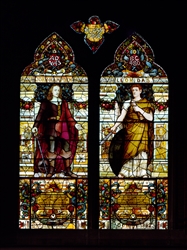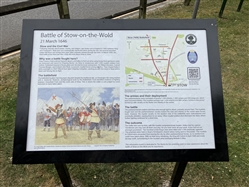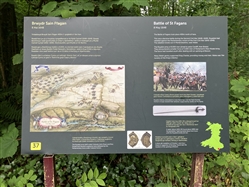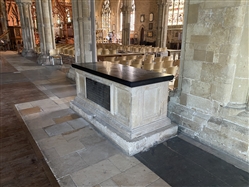Hampden, John, Stained Glass Window
Military Rank:
Colonel
First Name:
John
Last Name:
Hampden
Memorial Type:
Memorial - Stained Glass
Does the monument still exist?
Yes
Installation Date:
October 1882
Inscription:
CLASS OF 1858
1643 AD
John Hampden
Died for the cause of Civilisation and Law and the self-restrained freedom which is the result.
480 BC
Leonidas
As for the chances of life or death neither is welcome without honour or duty. Either is welcome in the path of honour and duty.
Allegiance:
Parliamentarian
Condition:
Good
Condition Description:
The Memorial Hall is part of the University of Harvard which and is an exceptionally well funded institution. The Hall is in regular use.
Memorial Notes:
In the left half stands John Hampden, a parliamentary leader of the opposition to the arbitrary rule of Charles I in England. He was wounded in the battle of Chalgrove Field in June 18, 1643, and died on June 24. In the right half is Leonidas, a Spartan King who commanded the Greek forces sent to hold the pass of Thermopylae in 480 BC against the advance of the Persian host under their king Xerxes. He was destroyed by the Persians when they outflanked his position. The death of both men in battle commemorates the valour and patriotism of the Harvard men who died in the American Civil War. Hampden's death following the battle of Chalgrove was a bitter blow to the ultimately victorious parliamentarians. Leonidas death at the battle of Thermopylae inspired the Greek City States to unify and defeat the Persain Empire. Arguably Hampden's Thermopylae 'moment' was at the end of the battle Brentford in November 1642 when his regiment halted the royalist advance on London.T he Memorial Hall honours the Harvard graduates who died in the American Civil War. The stained glass window no. 14 commemorates the six classmates of 1858 who did nor survive the war. The quotes used are extracts from war time letters of the graduates. The choice of John Hampden and Leonidas is poignant. Both fell in the cause of freedom.
Memorial Address:
The Annenbeg Memorial Hall, Harvard, 45 Quincy St, Cambridge, Massachusetts, MA 02138, USA
County:
Massachusetts
Country:
USA
Location within building:
At the eastern end of the northern wall of the Memorial Hall.
Geoloation:
USA no grid reference available






